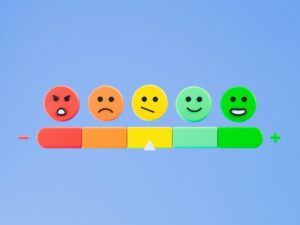While mental health continues to gain a greater and greater foothold in society, few mental health terms are widely known and understood. One exception to this rule in the modern world is bipolar disorder.
Part of the reason this disorder has become a household term is how many celebrities suffer from the illness. A wide range of actors and celebrities from the late Carrie Fisher to Mel Gibson, to Kanye West purportedly suffer from this disorder.
As a result, bipolar disorder has become a household term. That being said, little more than the name is known about this disorder or how it affects an individual. To diagnose bipolar disorder, you will first need to identify bipolar behavior.
Christians and Bipolar Disorder
For Christians, it is important to differentiate between the effects of a mental health disorder and sin. Sometimes bipolar behavior may overlap with what Christians would traditionally call sin. And sometimes the two are synonymous, but what is pivotal to differentiate is the cause.
For those suffering from bipolar disorder, their behavior may be dictated by the illness. While this does not release them from their responsibility or the consequences of the action, it should affect how the problem is approached.
Rather than tell those struggling with this disorder to “try harder” to control their behavior, they will need mental health assistance to gain control over their behavior. In situations like this, a Christian counselor is invaluable. They will be able to help their client address some of the underlying issues of the disorder and gain greater control over life.
Diagnosing a Bipolar Disorder
 Bipolar, at its core, is a swing between extreme emotional episodes. These episodes can be manic or depressive. A manic episode is a period where a client feels happy, irritable, or “up.” There is a sense of energy and excitement, paired with an increase in activity. These episodes are noticeable. They will be filled with a flurry of activity, and they may be rather chaotic.
Bipolar, at its core, is a swing between extreme emotional episodes. These episodes can be manic or depressive. A manic episode is a period where a client feels happy, irritable, or “up.” There is a sense of energy and excitement, paired with an increase in activity. These episodes are noticeable. They will be filled with a flurry of activity, and they may be rather chaotic.
On the other hand, depressive episodes consist of sadness, a sense of hopelessness, or apathy. These episodes are marked by little energy and excitement, and little activity. It’s common for clients to spend a large amount of time sleeping and not leave the house during these episodes.
Bipolar I
While bipolar consists of episodes, the nature of these episodes varies depending on the type of bipolar. Bipolar I is the most commonly known form of bipolar. It is marked by significant swings between manic episodes or a mix of manic and depressive episodes. Due to the extreme nature of this disorder, it is more widely known and more difficult to manage.
Bipolar II
Bipolar II also consists of episodes, but the natures of these episodes are different. Unlike Bipolar I, there are not manic episodes. Instead, the client will experience one or more severe depressive episodes with at least one hypomanic episode. Hypomania is a less extreme form of mania, making it less extreme than a manic episode.
Because the swings between these episodes are less extreme, this disorder is easier to manage in life and work, unlike Bipolar I.
Bipolar Symptoms and Behavior
The primary symptoms and behavior of Bipolar are related to manic and depressive episodes. Due to the stark contrast of the episodes, sometimes it is difficult to make sense of them. One month someone with bipolar might work non-stop, and the next month they might not get out of bed.
For this reason, it’s important to remember that bipolar disorders consist of a swing between emotional states. This will help you make sense of the varied symptoms and behaviors.
Manic Behavior
Mania can consist of a variety of symptoms. The below list is not comprehensive. Instead, these are six commons signs of mania.
- Feeling overly happy or “up” for a prolonged period without adequate cause
- Decreased sleep and increased restless energy
- Talking fast accompanied by racing thoughts and ideas
- Impulsive choices or thinking
- Overconfidence in your ability to perform or succeed
- Risky behavior, like gambling, impulsive sex, drug use, or shopping sprees
Depressive Behavior
Again, the below list is not comprehensive. Depression can take on many forms, but these are several common behaviors associated with depressive episodes.
- Feeling despondent, sad, or hopeless for a prolonged period.
- Closing off from relationships with friends and family
- Lack of interest in hobbies and activities you once loved
- Significant loss or gain of appetite
- Loss of energy or extreme fatigue, despite being rested
- Suicidal ideation and fascination with death
Bipolar Treatment
Bipolar disorder is a condition you will have your whole life. There is no perfect cure. Instead, the goal is to manage your symptoms so you can have control of your life. Depending on your exact situation, you will need a mix of the following treatments:
Medications This is the first step because it begins to start balancing your mood. Since mood swings are one of the biggest problems with this disorder, stabilizing your emotions is the first step forward.
Continued treatment Unfortunately, Bipolar disorder requires lifelong treatment with medications. This is true even when you feel periods of freedom and recovery from the disorder. A failure to keep up with your treatment, even when you aren’t experiencing symptoms, puts you at a high risk of falling back into full-blown manic or depressive episodes.
Day treatment programs Your counselor or doctor may prescribe for you to attend a day treatment program. These programs can be particularly helpful as you first try to get control of your symptoms. Over time, you may no longer need to attend these programs and instead can continue working with a counselor independently.
Substance abuse treatment Since this disorder is often associated with substance abuse, you may be recommended to enter a treatment program for drugs or alcohol. Without addressing these issues, it will be difficult to manage your bipolar disorder, if these issues are present.
Hospitalization If during your recovery or treatment, you fall into either an extreme manic or depressive episode, you may need to be hospitalized if self-harm or suicidal ideation is involved.
Facing Bipolar in Faith
Many Christians assume that Christian growth requires only prayer and reading of the Scriptures. And while there is much truth in this, for those suffering from mental health disorders, getting professional health will be pivotal for the development of faith.
Those facing an undiagnosed and untreated mental health disorder aren’t fully equipped to grow spiritually while handicapped by their condition. Rather than ignore this and step further into “faith,” it is important to acknowledge their need and pursue mental health professionals to help them gain control over their lives and behaviors.
Finding a Christian counselor is pivotal to help treat those with bipolar disorder. There is no known cure for bipolar disorder, but a combination of medicine and therapy can put you or your loved one back in control of their life.
A Christian counselor will use a two-pronged approach offering both tried and tested psychological methods as well as a rich, deep reliance on faith. They will help you gain greater control over your thoughts and behaviors, so you can begin relying more and more on your heavenly healer.
Your counselor does not need to work against your pastor, instead, if they choose to work in coordination, then you will be able to find greater control over your life and emotions while finding deep inner healing from the great physician.
Finding Support from a Christian Counselor
Bipolar disorder is a serious condition that can negatively affect your life. God designed you to have control over your emotional states. He calls you to exhibit the fruit of the Spirit which is characterized by peace, joy, and self-control. Bipolar episodes are the opposite of the fruit of the Spirit.
Before you can pursue that for yourself, you will need to find professional help to gain control over your behavior and symptoms. Getting help isn’t unbiblical. Instead, it’s the first step on your journey of health, healing, and faith. So, reach out to me or another Christian counselor today.
Photo:
“Scale”, Courtesy of Paris Bilal, Unsplash.com, Unsplash+ License
-
Cassidy Mangio-Gonzales: Author
Therapy is more than treatment – it’s transformation. It’s a journey toward wholeness, freedom, and living the truth of who God created you to be. I’m here to walk beside you as you grow stronger in your faith, your relationships, and your sense of s...
-
Kate Motaung: Curator
Kate Motaung is the Senior Writer, Editor, and Content Manager for a multi-state company. She is the author of several books including Letters to Grief, 101 Prayers for Comfort in Difficult Times, and A Place to Land: A Story of Longing and Belonging...
DISCLAIMER: THIS ARTICLE DOES NOT PROVIDE MEDICAL ADVICE
Articles are intended for informational purposes only and do not constitute medical advice; the content is not intended to be a substitute for professional medical advice, diagnosis, or treatment. All opinions expressed by authors and quoted sources are their own and do not necessarily reflect the opinions of the editors, publishers or editorial boards of Stone Oak Christian Counseling. This website does not recommend or endorse any specific tests, physicians, products, procedures, opinions, or other information that may be mentioned on the Site. Reliance on any information provided by this website is solely at your own risk.









